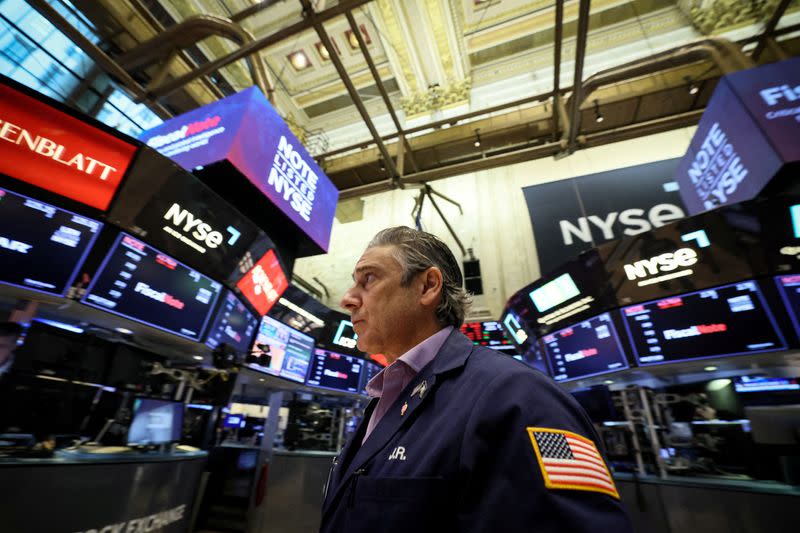Morning Bid - Japan returns from upside-down world, AI fizzes

A look at the day ahead in U.S. and global markets from Mike Dolan
If just two years ago, you'd imagined the day the Bank of Japan ended its negative interest rate era, you'd probably not have put the yen near 34-year lows through 150 per dollar or the Nikkei stock index within 2% of record highs.
Yet, here they are - and Bank of Japan policy rates are positive again for the first time since 2016 after the BOJ delivered its first rate hike in 17 years at Tuesday's meeting.
And it went big in its dismantling of its extraordinarily easy money regime - removing formal bond yield caps and purchases of stock funds.
Of course the move had been telegraphed for weeks, if not months, and only the timing was at issue.
And perhaps the market's eventual takeaway from the meeting was an emphasis on policy remaining "accommodative" with rates stuck around zero as a fragile economic recovery retains large rate gaps with other G7 nations.
The BOJ said it will continue its JGB purchases at broadly the same amount as before - which pushed yields lower on the day - even though it will scale back the maximum limit of its purchases.
Still the prospect of further hikes were left on the table. "If trend inflation heightens a bit more, that may lead to an increase in short-term rates," said BOJ Governor Kazuo Ueda said, without elaborating on the likely pace and timing of further moves.
And business welcomed the move, with the chair of Japan's biggest business lobby Keidanren describing it as "the appropriate policy decision at the appropriate time".
But with the long-awaited hike now out of the way, dollar/yen surged to 150.62 - within 1% of 2022's peaks. And the Nikkei gained 0.6% - about 1% from its record high set earlier in the month.
In the background, Australia's dollar weakened and shares there ended higher as the Australian central bank signalled greater confidence in inflation returning to its target range after leaving policy rates unchanged at 12-year highs of 4.35%.
And of course all now spins into the Federal Reserve's two-day meeting, which kicks off later on Tuesday.
The rates and currency market mood is hawkish going into the Fed meeting, although there was some relief on Treasury yields early Tuesday and spiky oil prices ebbed a bit.
Thanks largely to the yen swoon, the dollar was higher across the board, hitting its highest in almost three weeks.
But despite the cloudy U.S. interest rate picture, the buzz about artificial intelligence kept stock indexes buoyed.
Google's parent Alphabet jumped on a media report that Apple is in talks to build Google's Gemini AI engine into the iPhone.
Nvidia shares added almost 1% as it kicked off its annual developer conference as investors waited for new chip announcements from Chief Executive Jensen Huang.
But Super Micro Computer, which joined the S&P 500 on Monday, gave up earlier gains to close down 6.4%, making it the biggest percentage decliner on Monday. The stock, which has rallied furiously recently on bets it would benefit from AI, is still up more than 252% for the year-to-date.
And in a good day for mega caps, even Tesla climbed 6%, leading S&P 500 percentage gains, after the electric carmaker said it would soon increase the price of its Model Y EVs in parts of Europe.
But the tech and megacap flurry disguised a bad session for small caps, with the Russell 2000 ending down 0.7%.
Key diary items that may provide direction to U.S. markets later on Tuesday:
- U.S. Feb housing starts, Jan TIC data on foreign holding of Treasuries; Canada Feb consumer price data
- U.S. Federal Reserve's Federal Open Market Committee starts two-day policy meeting, decision Wednesday
- US Treasury auctions 20-year bonds, 12 month bills
(Editing by Bernadette Baum)
